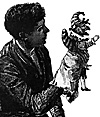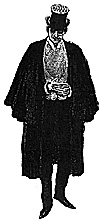
Originally appearing in Polyhedron Magazine, "Weasel Games" has now found its way to the pages of shadis. lester smith is, among other things the designer of TSR's monumental hit, dragon dice.
The Edge of the Bluff
Chess is not a weasel game. It is a mental wrestling match. There are no shifting alliances in chess, no surprise betrayals. The game is simply one individual trying to outthink another, trying to keep track of all the permutations of this move as opposed to that one.
And yet there is a psychological element to chess, one that even allows a bit of bluffing. Once I played a game of speed chess (in which players get a limited amount of time to make their moves, with a special clock to keep separate track of each player's time expenditure) versus a ranked amateur (with just a smidgen more dedication, he could have been a pro), and while I was little more than a "rank" amateur, he didn't know that. So I bluffed him.
He would make a carefully considered move, then I would make an outrageous one - with all the confidence I could muster. As an end result, his flag went up on the clock - I do not exaggerate - just as he reached to put my king in checkmate. My bravado had kept him cautious enough for me to win the contest of time. (Of course, that trick only worked once; I never came close to beating him again.)
Later, I read - in one of the many chess books he loaned me - of a similar situation concerning a chess pro who lost a game to a ranked amateur primarily due to the pressure of thinking "as a pro, I can't afford to lose to this ranked amateur."
If a straight-forward conflict like chess can involve such psychological elements, it shouldn't come as any surprise that weasel games thrive on them. Bluffing, for example, is a very foundation stone of weasel gaming. To a great extent, in a weasel game your are as strong - or as weak - as your opponents believe you to be. If they think you weak, they will attack without fear, and as one against many, you soon will be weak. On the other hand, if they think you strong, they will hesitate to attack, giving you the chance to entrench and become strong. (Though paradoxically, if they think you too strong, they may gang up on you, and as one against many...)
This is one of the great weaselly things about trading card games. Because you opponents cannot know for sure what cards you have built into your deck, you can bluff on a level not possible in other types of games.
The Wisconsin Chainsaw Massacre
One sinister example of this involves a local group of regular Jyhad/VtES players of which I'm part. Fairly early in our exploration of the game, I got the idea of building a deck around the Talbot's Chainsaw card and a group of low-life (pun intended) vampires invested with the Fame card. (This was before WotC decided to limit Fame by making it unique to each Methuselah, preventing me from playing more than one at a time.) The mystical chainsaw is quite a weapon in a scrap, but it also forces you to attack your own vampires, unless the wielder is in torpor (i.e. paralyzed as a result of sunlight, stake, vampire claws, or such).
Fame makes your prey lose significant blood points whenever the famous vampire goes into torpor. So I thought "Hmm. I wonder if it would work to build a deck of low-cost vampires - ones I wouldn't mind losing - make them famous, and send them into torpor with Talbot's Chainsaw."
 While at a convention, I mentioned the idea to an artist who works for WotC, and he said, "Sounds something like an 'Exploding Caitiff' deck." He went on to explain the deck: consisting of low level, famous vampires armed with grenades. In combat, they blow themselves up, forcing your prey to lose blood as a result.
While at a convention, I mentioned the idea to an artist who works for WotC, and he said, "Sounds something like an 'Exploding Caitiff' deck." He went on to explain the deck: consisting of low level, famous vampires armed with grenades. In combat, they blow themselves up, forcing your prey to lose blood as a result.
Once back home, I off-handedly mentioned to one of our local players my plan to build a deck along those lines, with lots of self-sacrificing vampires and a mystic chainsaw thrown in for good measure. The next thing I know, the other players were all abuzz with the need to devise some method of stopping this nefarious deck of mine. And when I showed up for that week's game, I was greeted with the terse question "Are you playing your exploding caitiffs tonight?" I didn't answer, just smiled smugly, content to let them all sweat. Although play soon made it obvious that I had not built the new deck, I went on to win that game, and I think the other players' nervousness gave me an advantage. It certainly demonstrated that mystery confers power in such games.
A Feinting spell
When Ed Stark joined the TSR fold a few years ago, while I was still on staff there, I watched him demonstrate another classic bluff again and again in lunch-time Blood Wars sessions. Ed would play a nasty card, luring the other players to spend cards to stop it; then he'd play an even nastier card once their interventions were all used up.
For example, he would lead off in combat with a Spies in the Walls card, allowing him to look at his opponent's Battle Hand; his opponent would counter with a Protection vs. Fate or Crown of Protection to negate the spies. Then Ed would play a Powers of Evil (or Good, or Neutrality) Intervene card which is what he had hoped to play all along, thereby winning the conflict automatically. The thing is, Ed would do it so smoothly that I was always surprised, even seen it happen time and time before.
I tip my hat to his weaselliness. Some people just have the gift it would seem.
Back to Shadis #33 Table of Contents
Back to Shadis List of Issues
Back to MagWeb Master List of Magazines
© Copyright 1997 by Alderac Entertainment Group
This article appears in MagWeb (Magazine Web) on the Internet World Wide Web.
Other military history articles and gaming articles are available at http://www.magweb.com